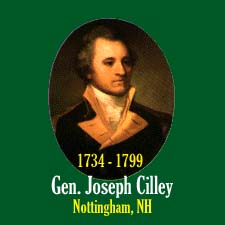|
FRESH STUFF DAILY |
|
|
||
|
|
||
|
|
||
|
SEE ALL SIGNED BOOKS by J. Dennis Robinson click here |
||
With a total population of fewer than one thousand souls, the frontier town of Nottingham, NH contributed more officers to the American Revolution than any other town of its size in New Hampshire. One of its illustrious officers was Joseph Cilley, a native son, born in 1734.
From Lawyer To Warrior As a self-taught lawyer and veteran of the French and Indian War, and a man concerned with the deepening rift with England, Cilley became extremely interested in military tactics. This keen interest was inspired, no doubt, by his neighbor on the square, Henry Dearborn, and by heated political discussions at McClarey's tavern. Such patriotic associations prompted him to join John Sullivan's party in removing cannon and ammunition from Fort William and Mary before the Revolution. Five months after the war began, the provincial legislature ordered Cilley to transport this ammunition from its scattered secret caches to the New Hampshire troops for use in the siege of Boston. After a disastrous attempt to salvage what was left of the American campaign in Canada where the troops were ravaged with smallpox, Cilley arrived in the summer of 1776 for the Battle of Long Island. Miraculously he and his regiment escaped through British lines which had surrounded them. That winter Cilley first tasted victory at Trenton and Princeton. These successful attacks on British outposts were crucial in improving American morale and in encouraging Congress to lengthen enlistments to three years. About the same time the New Hampshire line was reorganized and Cilley was made colonel of the 1st Regiment. Possession of the Hudson-Champlain Valley was imperative if New England was not to be separated from the rest of the country. In May, 1777, Cilley was ordered to Ticonderoga to strengthen that fortress. On July 6, Cilley and his men became part of the long summer retreat from Ticonderoga across the Hudson River and eventually to Bemis Heights. There on September 19 the two armies engaged in a devastating battle that ended in a draw. Routing The Redcoats By October 7th the British had to make a stand if their conquest of the Hudson-Champlain Valley was to succeed. The 1st New Hampshire entered the action facing crack grenadiers and light infantry. So hot was the firing that Cilley's men had to move forward out of their own smoke to fire again and the grenadiers went down in heaps. Amid the cheers of his men, Col. Cilley straddled one of the captured British 12-pounders and, waving his sword, shouted he was "dedicating it (the cannon) to the patriot cause." Jubilantly he ordered it turned on the retreating enemy. With the British surrender at Saratoga the Northern Campaign was over. For his valiant service at the Battle of Monmouth in June of 1778, the New Hampshire Legislature presented Col. Cilley with a pair of pistols in March, 1779. These he took with him that summer on Sullivan's expedition against the Indians in upper New York. Beloved by his men who found him always frank, fair and well disciplined, Cilley retired when regiments were combined in June, 1781. After the war Cilley served as general of the New Hampshire Militia. He died at his homestead, aged 65.
Originally published in "NH: Years of Revolution," Profiles Publications and the NH Bicentennial Commission, 1976. Reprinted by permission of the publisher. First appeared online on SeacoastNH.com in 1997. Photo of painting from NH State House collection. Please visit these SeacoastNH.com ad partners.
News about Portsmouth from Fosters.com |
| Saturday, April 20, 2024 |


|
Copyright ® 1996-2020 SeacoastNH.com. All rights reserved. Privacy Statement
Site maintained by ad-cetera graphics

 Link Free or Die
Link Free or Die



















